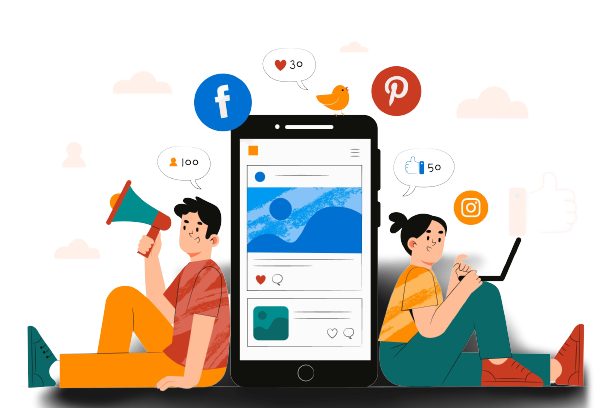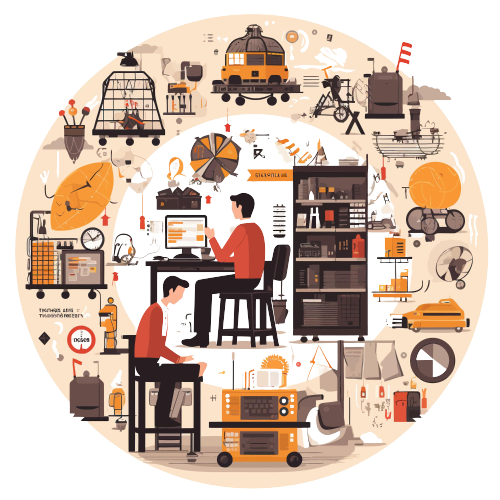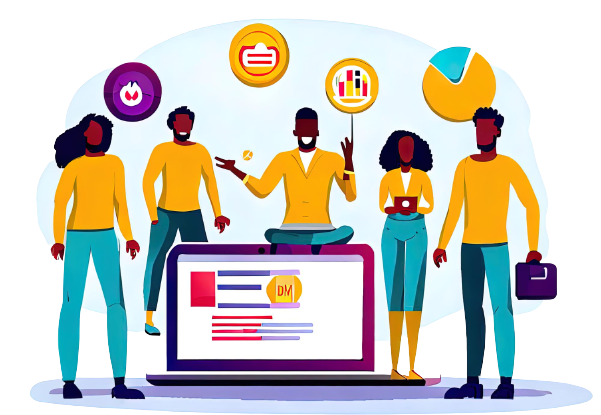
Businesses are constantly searching for that elusive edge to stay ahead of the competition. It’s like a race where the finish line keeps moving, and the competition never sleeps. So, what’s the secret sauce that can give your business the upper hand? Well, it might just be Social CRM Integration.
This might sound like a mouthful of tech jargon but fear not. In this blog, we’re going to break it down into plain and simple language. We’ll explore how Social CRM Integration can be your savior, helping you not only keep up with the digital times but actually thrive in them.
We live in a world where almost everything happens online. People connect, shop, work, and share their lives through the digital world. And guess what? Your customers are right there in that virtual space too. They’re chatting, browsing, liking, and tweeting about their experiences. That’s where Social CRM Integration steps in – it’s like the bridge that connects your business with your customers in this bustling digital world.
But why does this matter? Well, imagine being able to understand your customers better than ever before. Think of having the tools to respond to their needs, questions, and feedback instantly. Envision a world where you can tailor your products and services to match exactly what your customers want. That’s the power of Social CRM Integration.
In this blog, we’ll discuss different situations and conditions in which Social CRM Integration can gain a competitive advantage. So, if you’ve ever wondered how to not only survive but thrive in the digital world, you must continue reading this blog. Social CRM Integration might just be the missing piece of your competitive puzzle. Get ready to discover how it can transform your business and propel you to the front of the digital race.
The Psychology of Customer Engagement

Customer engagement is more than just a transaction; it’s about creating an emotional connection between your brand and your customers. To do this effectively, businesses need to tap into the following psychological principles:
- Reciprocity: The Principle of Giving
People have a natural tendency to reciprocate when they receive something of value. Businesses can leverage this by providing valuable content, personalized offers, or exceptional service through Social CRM Integration. When customers feel they’ve received something beneficial, they are more likely to engage and reciprocate by staying loyal or making a purchase.
- Social Proof: The Power of Peer Influence
Customers often look to the actions and opinions of others when making decisions. Social CRM Integration can showcase positive customer reviews, testimonials, and social media mentions, building social proof that encourages further engagement. When customers see that others are satisfied with your products or services, they’re more likely to engage.
- Authority: Trusting the Experts
People tend to trust and engage with authoritative figures or sources. Through CRM Integration, businesses can position themselves as industry experts by providing valuable insights, thought leadership content, and expert advice. Customers are more likely to engage with brands they perceive as knowledgeable and authoritative.
- Scarcity: The Fear of Missing Out
Creating a sense of urgency or scarcity can trigger engagement. By using CRM Integration to communicate limited-time offers or exclusive deals, businesses can tap into customers’ fear of missing out (FOMO), encouraging them to engage quickly and decisively.
- Emotional Connection: Building Lasting Relationships
Emotions play a significant role in customer engagement. CRM Integration allows businesses to personalize interactions, addressing individual needs and concerns. By demonstrating empathy, understanding, and care, brands can forge emotional connections that lead to long-term engagement and loyalty.
Leveraging Social CRM Integration for Psychological Engagement

Now that we’ve explored the psychology behind customer engagement, let’s see how Social CRM Integration can effectively leverage these insights:
- Personalization: Social CRM Integration allows businesses to gather and analyze customer data to create personalized experiences. By tailoring content, recommendations, and communication to individual preferences, brands can make customers feel valued, increasing engagement.
- Feedback and Engagement Analysis: CRM tools provide the ability to analyze customer feedback and engagement patterns. By understanding what resonates with customers, businesses can refine their strategies to better align with psychological principles that drive engagement.
- Segmentation: CRM Integration enables segmentation of customer groups based on various factors. This segmentation allows businesses to target specific psychological triggers that resonate with different customer segments, thereby enhancing engagement.
- Timely Communication: Social CRM Integration provides real-time insights into customer behavior and preferences. Brands can use this information to send timely and relevant messages or offers, aligning with the principle of reciprocity and tapping into customers’ emotional states.
- Building Trust and Authority: CRM Integration can facilitate the sharing of expert content, thought leadership, and educational materials. By positioning the brand as a trusted authority, businesses can appeal to customers’ need for authoritative guidance.
Understanding the psychology of customer engagement is essential for businesses looking to create meaningful connections with their audience. By incorporating these insights into your CRM strategy, you can connect with your customers on a deeper level and stay ahead in the digital world.
Sustainability and Social CRM: A Competitive Edge

In an era characterized by increasing awareness of environmental and social issues, businesses are under growing pressure to not only deliver quality products and services but also demonstrate a commitment to sustainability. Sustainability has evolved from being a corporate social responsibility checkbox to a strategic advantage in the digital marketplace. One powerful way to integrate sustainability into your business strategy is by incorporating it into your CRM strategy. Let’s explore how sustainability initiatives within your CRM can set your business apart in the digital marketplace.
The Evolution of Sustainability in Business
Sustainability is no longer just a buzzword; it’s a fundamental aspect of business strategy. Consumers today are more conscious of the environmental and social impacts of their purchasing decisions. They prefer to engage with companies that share their values and actively contribute to making the world a better place.
Sustainability encompasses a wide range of initiatives, including reducing carbon footprints, ethical sourcing, waste reduction, and community engagement. Many businesses have made significant strides in these areas, but what’s often overlooked is the integration of sustainability into customer relationship management.
Why Sustainability Matters in CRM?
- Aligning Values: Today’s consumers want to support businesses that share their values. By incorporating sustainability initiatives into your CRM, you signal to your customers that you are committed to the same ethical principles they hold dear.
- Building Trust: Sustainability initiatives foster trust. When customers see that you’re actively working to reduce your environmental impact or support local communities, they are more likely to trust your brand.
- Enhanced Customer Engagement: Sustainable practices often resonate with customers on a personal level. When you integrate sustainability into your CRM strategy, you can create campaigns and communications that connect with your audience on a deeper level, driving engagement.
- Differentiation: In a crowded digital marketplace, it can be challenging to stand out. A well-defined sustainability-focused CRM strategy can differentiate your business from competitors who may not prioritize sustainability.
Incorporating Sustainability into CRM
So, how can you incorporate sustainability initiatives into your CRM strategy?
- Customer Data for Sustainability Insights: Utilize CRM data to identify customer preferences related to sustainability. This can inform product development, marketing campaigns, and customer engagement strategies.
- Sustainable Product Recommendations: If you have sustainable product offerings, use CRM to recommend these products to customers who have shown an interest in eco-friendly or ethical options.
- Green Marketing Campaigns: Create and track green marketing campaigns through CRM, showcasing your sustainability initiatives and encouraging customers to participate in your efforts.
- Community Engagement: Use CRM to track and engage with local communities and charitable organizations. Show your commitment to giving back through partnerships and donations.
- Feedback Loops: Set up CRM feedback mechanisms that allow customers to provide suggestions on how you can improve your sustainability efforts. This not only shows that you’re receptive to customer input but also allows you to refine your sustainability initiatives.
The Competitive Advantage of Sustainable CRM Integration
Thus, sustainability and Social CRM Integration offer a unique competitive edge in the digital marketplace. It’s not just about doing good; it’s about doing well by aligning your business with the values of your customers and society at large. It’s a win-win proposition in today’s digital business landscape.
Social CRM Integration in Non-Traditional Industries

Traditionally, industries like retail, e-commerce, and finance have readily adopted CRM solutions to streamline operations, improve customer interactions, and gain a competitive edge. However, the application of CRM doesn’t stop there. Let’s find out how non-traditional industries are leveraging Social CRM Integration to create a unique competitive advantage.
Redefining Non-Traditional Industries
When we think of CRM, sectors such as retail and banking often come to mind. Yet, non-traditional industries, including healthcare, education, and manufacturing, are increasingly recognizing the value of CRM integration. Here’s how:
- Healthcare: Revolutionizing Patient Care
In the healthcare industry, where patient satisfaction and care quality are paramount, CRM integration has become a game-changer. Social CRM tools allow healthcare providers to gather patient feedback, monitor health outcomes, and personalize care plans. For example, patient data collected through CRM integration can help doctors make more informed decisions, while also enabling proactive patient engagement through appointment reminders and follow-ups. This not only improves patient outcomes but also enhances the healthcare institution’s reputation.
- Education: Tailoring Learning Experiences
Educational institutions are embracing Social CRM Integration to enhance the student experience. By tracking student interactions, academic performance, and feedback, schools and universities can tailor educational programs to individual needs. This personalized approach boosts student engagement and retention rates. Additionally, CRM tools help institutions manage administrative tasks more efficiently, ensuring smoother operations.
- Manufacturing: Streamlining B2B Relationships
Even in manufacturing, where the focus is on production, CRM integration plays a crucial role. By connecting with suppliers, distributors, and partners through social CRM, manufacturers can optimize their supply chains, manage orders more effectively, and respond quickly to market demand fluctuations. This level of integration fosters better B2B relationships, streamlining operations and making the company more competitive in the industry.
- Non-Profit and Charity Organizations: Strengthening Donor Relationships
Non-profit organizations rely heavily on donor relationships and support. Social CRM Integration enables them to maintain a comprehensive database of donors, their preferences, and past contributions. With this information, non-profits can engage with donors on a more personal level, tailor fundraising campaigns, and show the impact of their donations. This transparency and personalized approach can be a significant competitive advantage in attracting and retaining donors.
- Government and Public Services: Enhancing Citizen Engagement
Government agencies are increasingly using Social CRM Integration to engage with citizens more effectively. By collecting feedback, addressing concerns, and providing information through digital channels, government organizations can enhance citizen satisfaction and trust. This can lead to improved public services, more efficient governance, and a competitive advantage in terms of public support.
The Competitive Edge of Non-Traditional CRM Integration
In non-traditional industries, Social CRM Integration offers a competitive edge by:
- Improving Service Quality: CRM integration enhances the quality of services, whether it’s patient care in healthcare or customized education plans in academia.
- Boosting Efficiency: By automating processes and streamlining operations, CRM integration frees up resources to focus on core activities.
- Building Stronger Relationships: Non-traditional industries can leverage CRM to foster deeper, more personalized relationships with their stakeholders, whether they’re patients, students, donors, or citizens.
- Enhancing Data-Driven Decision-Making: Access to data and analytics through CRM integration allows for data-driven decision-making, improving strategic planning and resource allocation.
- Staying Competitive: Embracing CRM integration allows non-traditional industries to keep pace with changing customer expectations and emerging digital trends.
Thus, non-traditional sectors are recognizing its potential to enhance services, improve efficiency, and build stronger relationships, ultimately gaining a competitive advantage in a rapidly evolving digital world. As these industries continue to innovate, we can expect to see even more creative applications of CRM integration in the future.
Cross-Generational Customer Engagement Strategies

Businesses face the unique challenge of catering to the preferences and expectations of multiple generations simultaneously. From Baby Boomers to Generation Z, each generation has distinct communication styles, technological aptitudes, and preferences. This diversity among consumers necessitates the development of cross-generational customer engagement strategies that harness the power of Social CRM Integration. Let’s find out how businesses can effectively engage customers across generations using Social CRM Integration.
Understanding the Generational Divide
Before delving into strategies, it’s essential to grasp the characteristics and behaviors that distinguish different generations:
- Baby Boomers (born 1946-1964): Baby Boomers tend to prefer more traditional forms of communication, such as phone calls and emails. They value personal relationships and may be less active on social media.
- Generation X (born 1965-1980): Gen Xers are tech-savvy but appreciate a balanced approach to communication. They are likely to engage with brands through a mix of online and offline channels.
- Millennials (born 1981-1996): Millennials are the first digital natives. They expect seamless online experiences, value authenticity, and are active on social media.
- Generation Z (born 1997-2012): Gen Zers are true digital natives, with a preference for short, visual content. They value privacy and authenticity in brand interactions.
Crafting Cross-Generational Customer Engagement Strategies with Social CRM Integration
- Social CRM Integration allows businesses to collect and analyze customer data. Leverage this data to personalize interactions for each generation. For instance, send personalized email newsletters to Baby Boomers while engaging Gen Z with visually appealing social media content.
- Recognize that different generations may prefer various communication channels. Use Social CRM Integration to maintain a consistent presence across channels like email, social media, and phone calls, catering to the preferences of each generation.
- Create content that resonates with each generation. Share long-form blog articles or informative videos for Baby Boomers, whereas Gen Z may respond better to short, visually engaging TikTok videos or Instagram Stories.
- Utilize analytics tools integrated with your CRM to monitor engagement metrics among different generations. Adjust your strategies based on the data, optimizing for what works best for each group.
- Encourage feedback from customers of all generations. Social CRM Integration can help you gather and analyze this feedback efficiently. Act on suggestions to show that you value input from every demographic.
- While tailoring approaches, ensure that your brand’s core values and messaging remain consistent. This helps build trust across generations.
- Ennsure that your digital content and platforms are accessible to all, considering the needs of older generations who may have different technology challenges.
Social CRM Integration is the linchpin that enables businesses to adapt and tailor their customer engagement strategies effectively. By understanding the unique preferences and behaviors of each generation, businesses can bridge the generational gap and foster meaningful connections with customers of all ages.
Innovative CRM Tools for Tomorrow’s Competitiveness
As we journey through the rapidly evolving landscape of digital business, the importance of innovative social media CRM tools cannot be overstated. It is abundantly clear that the future of competitiveness in the digital realm hinges on the embrace of innovation within CRM. Here are the key takeaways:
- Adaptability is the Key to Survival: In an ever-changing digital environment, adaptability is paramount. Innovative CRM tools empower businesses to be flexible and responsive to evolving customer needs, market trends, and technological advancements.
- Data-Driven Insights Fuel Success: The wealth of customer data available today is a goldmine waiting to be tapped. By harnessing the power of advanced analytics, artificial intelligence, and machine learning, businesses can gain profound insights into customer behavior, enabling them to make informed decisions and predictions that shape their strategies.
- Personalization is the Currency of Engagement: Tomorrow’s competitiveness relies on delivering personalized experiences that resonate with customers. CRM tools equipped with AI-driven personalization capabilities enable businesses to create tailor-made interactions, deepening customer engagement and loyalty.
- Omni-Channel Excellence is Non-Negotiable: Customers interact with businesses through a multitude of channels, from social media to email, chat, and voice. Innovative CRM solutions seamlessly integrate these channels, ensuring a consistent and cohesive customer experience regardless of touchpoints.
- Automation Enhances Efficiency: Automation is the linchpin of efficiency and productivity in tomorrow’s competitive landscape. By automating routine tasks and workflows, businesses can free up valuable resources to focus on strategic initiatives and customer relationship building.
- Customer-Centricity is a Must: The heart of any successful CRM strategy is a customer-centric approach. Innovative CRM tools enable businesses to truly listen to their customers, understand their needs, and respond proactively, fostering trust and loyalty.
- Stay Ahead of the Curve: Finally, to remain competitive in tomorrow’s digital world, businesses must stay ahead of the curve. Embrace emerging technologies, stay informed about industry trends, and be willing to evolve continuously.
Innovation in CRM is not a destination but a journey—an ongoing quest for excellence, driven by the relentless pursuit of better customer experiences and stronger relationships. As we look to the future, the businesses that are proactive in adopting and adapting innovative CRM tools will undoubtedly be the ones that thrive in tomorrow’s fiercely competitive world.